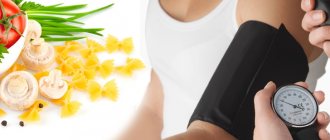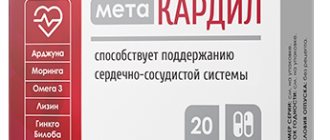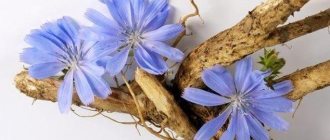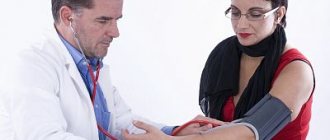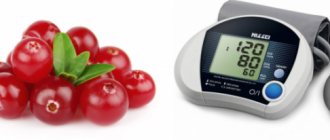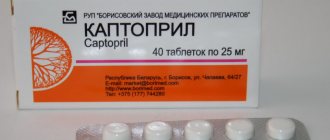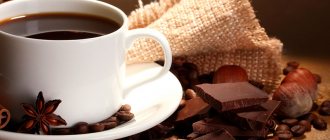Medicines that increase blood pressure are of interest to either hypotensive patients who need to get rid of a symptom, or hypertensive patients who want to prevent an even greater increase in pressure. Hypotension (decreased blood pressure) threatens drowsiness, fatigue (even if a person has slept and rested normally), decreased mental abilities and physical activity. A person becomes drowsy and may sleep longer at night than people with normal blood pressure.
- Non-drug treatments for hypotension
- Medicines for high blood pressure
- Citramon to increase blood pressure
- What does Askofen help with?
- Does Coficil Plus increase blood pressure?
- Does pu-erh increase blood pressure?
- Pressure and Cordiamine
- Does creatine increase blood pressure?
- Does Ketorol increase blood pressure?
- Propolis - for blood pressure?
- Antibiotics and blood pressure
- Ascorbic acid and blood pressure
- Pentalgin - does it lower blood pressure?
- Does Echinacea Increase Blood Pressure?
- Ibuprofen increases blood pressure
- Actovegin for blood pressure
- Pentalgin and blood pressure
Non-drug treatments for hypotension
It is possible to increase blood pressure without medications to some extent, and this measure is purely individual. It is important to walk in the fresh air more often, at least an hour a day, and for pregnant women - at least an hour in the morning/afternoon and an hour in the evening. Sports or physical activity stimulates blood circulation, and accordingly, blood pressure normalizes. Although it is known that professional athletes have slightly lower blood pressure levels than other people.
If you notice problems with blood pressure, it will be useful to take a contrast shower in the morning (alternate cold and hot water). This procedure has its own characteristics, which we will not describe here. To normalize blood pressure, proper nutrition is important. During fasting, the body begins to save resources, temperature and pressure decrease. Sleep should be at least 8 hours a day for teenagers and adults. You should also avoid overwork, both mental and physical equally. Alternate mental and physical activities.
Hypotension
Blood pressure (BP) is one of the main vital signs along with heart rate, breathing rate and temperature. This is the force with which blood presses on the walls of blood vessels.
It is usually represented by two numbers.
- The first is systolic (upper) pressure - this is the pressure formed in the vessels during systole (contraction of the heart).
- The second is diastolic (lower) pressure - this is the pressure that exists in the vessels during relaxation of the heart (diastole).
Systolic pressure is always higher than diastolic.
Normal pressure is considered to be in the ranges
- from 100 to 139 mm Hg. for systolic (“upper”) blood pressure
- from 60 to 89 mm Hg. Art. for diastolic (“lower”) blood pressure.
Hypotension is a condition in which blood pressure (BP) drops below normal.
Tachycardia (high pulse) is an acceleration of the heart rate in an adult to 90 beats per minute or more.
Low blood pressure with a high pulse may require emergency medical attention.
Usually, a person’s blood pressure decreases first, and then tachycardia develops as a compensatory reaction, which is aimed at improving blood supply to organs and tissues. Less common is a situation where a rapid pulse precedes a decrease in blood pressure.
The causes of low blood pressure lie both in external influences on the body and in serious diseases.
Causes of high pulse with low pressure Physiological tachycardia against the background of reduced blood pressure can occur
- During physical activity. Professional and novice athletes do not always correctly calculate the necessary physical activity and overstrain the body. It, in turn, goes into “energy-saving mode,” reducing heart rate and blood pressure.
— When adapting to new conditions . This is especially common among travelers. Climate change when moving to another country, changing time zones, as well as changes in altitude when climbing mountains can be associated with changes in atmospheric pressure.
- In case of emotional turmoil, stress or depression.
— In case of violation of the body’s usual diet . When the body doesn't have enough nutrients to function properly, it responds by lowering blood pressure. A deficiency can be caused by long-term fasting, which is carried out to cleanse the body of toxins, as well as mono-diets, in which a person consumes only one product, depriving his body of the flow of nutrients. After consuming certain foods or drinks, for example, caffeine-containing drinks, sweet carbonated drinks in large quantities.
- after a hot bath, a visit to a sauna or bathhouse, staying in a stuffy room, or in a subway car. The body is in unusually warm conditions. As a result, blood vessels dilate and blood pressure decreases.
Reasons why your heart rate increases when your blood pressure is low include:
- sudden and severe blood loss caused by illness, wounds or injuries. Losing blood, the heart begins to beat faster to maintain blood pressure, reducing the level of blood flow in the vessels. As a result, blood pressure decreases and the skin turns blue.
- shock conditions due to allergic reactions (anaphylactic shock), poisoning, injuries;
- pregnancy period;
- with prolonged vomiting, diarrhea, heat stroke;
- exacerbation of internal diseases. Heart failure leads to the fact that the heart stops pumping blood normally, and the blood vessels lose their former elasticity.
- alcohol abuse;
- atherosclerotic damage to blood vessels;
- vitamin deficiency;
- decrease in body temperature;
- panic attacks;
- a sharp drop in blood glucose levels.
- a sharp increase in the level of thyroid hormones in the blood;
- sepsis (blood poisoning).
- taking certain medications: antibiotics, antidepressants, painkillers, diuretics, some alcohol tinctures and a number of other drugs.
- An overdose of narcotic substances also threatens the development of tachycardia, accompanied by hypotension.
Sometimes blood pressure decreases due to a significantly accelerated heartbeat, since the heart does not have time to fill with blood, which leads to a decrease in the volume of blood ejected with each heartbeat.
Tachycardia that leads to hypotension is rare. It can develop suddenly in the presence of coronary heart disease.
Symptoms of low blood pressure
- weakness, drowsiness, absent-mindedness, decreased performance;
- dizziness;
- nausea;
- vomit;
- loss of consciousness;
- impaired coordination of movements;
- pale skin;
- slowing or increasing heart rate.
- headache.
- Hypotension is often accompanied by autonomic disorders - sweating of the palms and feet, thermoregulation disorders - a decrease in temperature to 35.8 - 36? C, sometimes there may be a feeling of incomplete inspiration or shortness of breath during physical activity.
FIRST AID FOR HYPOTENSION
The first thing to do if there is a sudden drop in blood pressure is to make sure that the victim is not diabetic and does not have an injury or injury that could cause internal bleeding. Indeed, in the presence of internal bleeding, measures designed to increase blood pressure can accelerate blood loss, and an attempt to medicinally narrow the blood vessels to increase pressure with low glucose levels will not give any result.
Patients with diabetes, as a rule, have special tokens or cards in their documents confirming the presence of diabetes. This can help if the patient is unconscious or incoherent. Among the external signs of a sharp drop in glucose in a diabetic is the smell of acetone from the mouth.
If you are sure that the cause of the victim’s drop in blood pressure is not diabetes or internal bleeding, then the following actions should be taken.
- Place the victim on a horizontal surface, on his back,
- Elevate your legs and place a pillow or folded blanket under your shins.
- provide access to fresh air, open a window or vent,
- remove tight clothing, unbutton or remove clothing that restricts breathing.
- measure blood pressure - you need to make sure that it is below normal, write down the result, record the time.
- drink strong, hot, sweet tea.
- cover with a blanket or blanket, because a drop in pressure is usually accompanied by a significant decrease in body temperature.
If, despite the measures taken, the pressure continues to drop and the patient loses consciousness, call an ambulance immediately.
What absolutely NOT to do to increase blood pressure.
— Do not give the patient tablets containing caffeine or coffee. Caffeine causes an increase in heart rate, and this is extremely undesirable in a situation with low blood pressure.
— Do not give alcohol to the patient under any circumstances. It dilates peripheral vessels, and this will cause an even greater decrease in pressure.
— If the patient is conscious, there is no need to let him snort ammonia or other substances with a pungent odor - this will only increase the heaviness and pain in the head.
Medicines for high blood pressure
If non-drug methods of increase do not produce results, you need to resort to the use of medications. A common remedy is caffeine sodium benzoate (tablets). This stimulant is known throughout the world and is added to energy drinks. However, they increase blood pressure, but negatively affect the functioning of the gastrointestinal tract. Therefore, drinking energy drinks is not recommended!
Caffeine is also known as trimethylxanthine. This is a powder that has a bitter taste. This substance is also a diuretic; it dilates peripheral blood vessels. It increases blood pressure only for a while. With normal blood pressure, the readings may not change when taking caffeine. You should follow the dosage prescribed by your doctor (or indicated in the instructions for the drug). In large doses, the drug can negatively affect some organs; it is also rare, but it causes addiction.
The second popular remedy is lemongrass tincture. 25 drops are diluted in 100 ml of water. Give to the patient 15 minutes before meals, 2-3 times a day. It is not recommended to take this alcohol infusion at night. If you have insomnia, try using it only in the morning and at lunchtime, and after 16:00 do not drink lemongrass tincture to increase blood pressure.
Ginseng tincture is the third most popular remedy for increasing blood pressure in hypotensive patients. The drug is also believed to strengthen the immune system. Do not use this medicine in the evening as it will make it difficult to fall asleep. This remedy is also not suitable for pregnant and breastfeeding women. One dose delivers an average of 20 drops.
Eleutherococcus is also a popular remedy for raising blood pressure. It relieves accumulated fatigue and is used in frequent stressful situations. After long illnesses, the body is weakened, so the doctor may also prescribe a tincture of Eleutherococcus. But this is not only a tincture; the drug is available in capsules and tablets. There is also dry raw material that is brewed and drunk. The most popular is the liquid extract of Eleutherococcus. Take 1-3 times a day, 15-30 drops (depending on the age and weight of the patient). The course of treatment for hypotension is 30 days.
Leuzea extract normalizes blood pressure, tones the body and strengthens the body's defenses. Thanks to this remedy, the body adapts to heavy loads. Take 1-3 times a day, twenty or thirty drops. This drug is also available in tablet form, take a maximum of 3 times a day, 1-2 tablets.
All the drugs mentioned above stimulate, to a greater or lesser extent, the activity of the heart, blood vessels and nervous system. Thus, after taking one of these drugs, a person’s vascular tone increases, which is why blood pressure increases. Below we will describe how other drugs that people periodically use to treat hypotension affect blood pressure readings.
What pills are there for hypotension?
What can be taken for low blood pressure is decided only by a doctor. Taking into account the patient’s condition, concomitant diseases, age, the specialist chooses which drug will be effective in a given situation.
In case of low blood pressure, drugs from different groups based on chemical and herbal components can be prescribed. The tablets can be taken with formulations according to traditional medicine recipes.
The most effective tablets based on herbal ingredients are Eleutherococcus, Lemongrass, and Ginseng. They stimulate the central nervous and cardiovascular systems, give vigor, increase blood pressure, reduce drowsiness and fatigue.
Such drugs as “Etimizol”, “Saparal”, “Apilak”, “Pantocrine”, produced in the form of tablets and capsules, have tonic properties. They add vitality, relieve symptoms of fatigue, improve concentration and memory.
Analeptics (Centedrin, Cordiamin) will help cope with the symptoms of low blood pressure by stimulating the vaso-respiratory center of the medulla oblongata.
Nootropic drugs (Piracetam, Pyridit, Pantogam, Phenibut) activate metabolic processes in the central nervous system and improve blood circulation. They are available in tablet form, so you can take long courses at home.
Vitamins help cope with the negative effects of hypoxia. They increase physical and emotional endurance, regenerate the body after stress, improve blood counts and increase the body's resistance.
What other medications are prescribed for low blood pressure? When a drop in pressure is associated with vegetative dystonia, anticholinergics are prescribed. Adrenergic tablets increase blood pressure by dilating blood vessels and improving circulation. Analeptics help stimulate the functioning of the heart, brain and blood vessels.
"Citramon"
When a decrease in blood pressure is accompanied by a severe headache, you should take a Citramon tablet. The active components of the drug relieve inflammation, relieve pain, dilate blood vessels, improve blood flow, and reduce drowsiness.
You can take 1-2 tablets after meals. Re-downloading is possible after 7 hours. Tablets should not be taken by patients with severe anemia, gastrointestinal ulcers, hypertension, liver and kidney diseases.
"Caffeine"
Caffeine tablets are prescribed to increase blood pressure. They activate mental excitability, improve mood, relieve fatigue, increase concentration, and reduce pain.
Tablets are taken three times a day, regardless of meals. It is not recommended to take the drug before bedtime. The dosage for children over 12 years of age and adults is 50-100 mg. The duration of treatment can be several weeks.
"Gutron"
For hypotension, it is recommended to take Gutron tablets. They improve blood circulation, increase vascular tone and relieve unpleasant symptoms accompanying the disease. The drug is prescribed at a dose of 2.5 mg 2 times a day.
Contraindications: serious eye diseases, arterial hypertension, urinary tract and prostate diseases.
"Ekdisten"
The active ingredient of the drug "Ecdisten" is obtained naturally, so even a long course of treatment does not affect the liver. Natural ingredients that increase blood pressure, have tonic properties and improve metabolic processes in the body.
The drug is approved for use from 18 years of age. It is recommended to take 1-2 tablets after meals. Duration of treatment is 2-3 weeks. Contraindications: epilepsy, hypertension, peptic ulcer, insomnia.
"Rantarine"
The drug "Rantarine" based on reindeer antler extract will help raise blood pressure. Horns are horns that have not had time to ossify. They contain many trace elements and amino acids. "Rantarine" improves brain function, tones the nervous system, normalizes blood pressure, and increases the body's resistance to various adverse effects.
Tablets are taken 2-3 times a day 35 minutes before meals. Duration of therapy is 2-4 weeks.
The drug should not be used by people with severe heart failure and cardiac arrhythmia, atherosclerosis, epilepsy, cancer, kidney or liver diseases.
"Heptamil"
Heptamyl tablets will help raise blood pressure and eliminate unpleasant symptoms. The active ingredient of the drug is aimed at increasing the tone of the heart and vascular system and improving blood circulation.
The drug is taken in the form of two tablets (100 mg) 2-3 times a day. The drug is prescribed with caution in the presence of arrhythmias and other heart pathologies.
"Simptol"
The drug "Symptol" normalizes low blood pressure, increases the volume of circulating blood and relieves inflammation. For hypotension, it is recommended to drink 30-40 drops of a 10% solution of the drug three times a day.
Contraindications are atherosclerosis, vascular spasm, arterial hypertension, severe diseases of the endocrine system and heart.
"Apilak"
The drug "Apilak" based on royal jelly contains many micro- and macroelements and amino acids. Improves metabolic processes, gives vigor, increases blood pressure and strengthens the immune system. Often tablets are prescribed for hypotension and nervous disorders. Mature patients are prescribed one tablet three times a day. Keep the tablet under your tongue until completely absorbed.
Contraindications: children under 18 years of age and allergies to bee products.
"Cordiamin"
Cordiamine stimulates the central nervous system, tones and constricts blood vessels, causing an increase in blood pressure. The recommended dose of drops is dissolved in water. The dose for adults is 75 drops, divided into three doses.
You should not take the drug if you have epilepsy, increased body temperature, or increased blood pressure.
"Eleutherococcus"
Among the drugs prescribed to increase blood pressure, Eleutherococcus ranks first. The plant component, in addition to ascorbic acid, leads to the normalization of the cardiovascular system. Signs of fatigue are reduced, performance increases and the body's resistance to adverse factors increases.
The drug is taken 25 minutes before breakfast and lunch, 1-2 tablets. Duration of treatment is from 2 to 4 weeks. The course is repeated every other week.
"Midodrine"
Midodrine constricts blood vessels and increases blood pressure. The dose is 2.5 mg 2 times a day. For a long course, the dose can be reduced to half a tablet.
Midodrine, like all drugs from the group of adrenergic agonists, has contraindications: increased intraocular pressure, arterial hypertension, diseases of the thyroid gland and prostate.
"Glycine"
“Glycine is a well-known drug that improves metabolic processes in the brain and activates the central nervous system. It increases resistance to stressful situations, improves mood and sleep quality, and reduces symptoms of hypotension.
The ingredients that increase blood pressure are harmless, so the drug can be prescribed during pregnancy and childhood. Place the tablet under your tongue and hold it there until it dissolves. Adults are prescribed one tablet 2-3 times a day. The duration of treatment is one month.
"Piracetam"
Piracetam is a nootropic drug. The tablets improve metabolic processes and blood circulation in all structures of the brain, eliminate the effects of hypoxia, and improve the activity of the brain, heart and blood vessels.
The tablets should be eaten whole, without chewing, with plenty of water. Adults can drink up to 160 mg of the drug per day in 3-4 doses. Treatment lasts up to two months.
Contraindications are cerebrovascular accidents and severe kidney pathology.
Citramon to increase blood pressure
Citramon contains acetylsalicylic acid, paracetamol and caffeine. The first component thins the blood, the second reduces pain, and caffeine, as already noted, stimulates breathing, nerves and heart activity. It has a positive effect on blood circulation, so the body receives more oxygen. When the pressure normalizes, the person begins to work more actively. It is believed that citramon increases blood pressure. But the content of the invigorating component in this medicine is very small, so you will need 2 tablets, and even then they do not help in all cases.
What does Askofen help with?
The composition of this medicine is similar to Citramon, only different proportions are used. The drug helps relieve pain, inflammation, and it also normalizes the temperature if it is elevated. Due to the fact that it contains caffeine, the effect of which is described above, the excitability of the central nervous system increases, fatigue goes away to some extent, and the person becomes more active. Askofen increases blood pressure if it is low. It should be taken for hypotension in the amount of 2 tablets, but it does not help everyone, and its effect is short-lived (relates to increasing blood pressure). Continuous use of the drug is not recommended.
Fighting sleepiness
To avoid falling asleep on the go all day, it is recommended to drink coffee: in moderation, 2-3 cups. Hypotonic patients can indulge in this drink in the evenings without harm to their health. It does not cause insomnia, on the contrary: it returns a comfortable physical state and makes it easier to fall asleep. The next morning after drinking coffee, such people also feel more energetic.
But you need to be careful with green tea. Although it contains caffeine, other active substances in the drink dilate blood vessels, lowering blood pressure even more. For hypotension, strong black is more beneficial.
If you are very tired during the day, it is recommended to take a short rest: sleep for about 1–1.5 hours. This will allow the nervous system to reboot and give strength for the second half of the day. If this is not possible, it is advisable to have on hand collections of invigorating plants: lemongrass, eleutherococcus, ginseng root. In extreme cases, a can of energy tonic will do. But you can drink it no more than twice a month. Otherwise, the opposite effect will occur - vascular tone will decrease.
Does Coficil Plus increase blood pressure?
This drug is sometimes prescribed instead of askofen and citramon. It also contains paracetamol, aspirin and caffeine. Coficil Plus relieves pain and inflammation, and also has psychostimulating activity. This medicine increases blood pressure, again due to the presence of caffeine in its composition.
Coficil Plus should be taken after meals in the amount of 1-2 tablets. You can take no more than six tablets per day. The course lasts up to 5 days. With longer use, a negative effect on the organs and systems of the body is likely. If you take too many pills, you may experience heart palpitations, short-term hypertension, and tinnitus. To get rid of this condition, sorbents are used. Coficil Plus should not be taken to lower blood pressure!
Does pu-erh increase blood pressure?
Pu-erh is a dark variety of tea, but not black, as the manufacturing technology is different. Budget options for this tea are ready-made Pu-erh (Shu) and raw Pu-erh (Shen). At reduced pressure, the second of them is used. Thanks to it, the body’s tissues receive more nutrition, and digestion is normalized to some extent.
Shu Pu'er should not be drunk in large quantities. It lowers cholesterol in the blood, is used to prevent vascular and heart diseases, and removes harmful substances and toxins from the body. Pu-erh increases blood pressure, so if the norm is exceeded, short-term hypertension may occur. To avoid affecting blood pressure, drink it not so strong or in the amount of 1-2 cups per day. It is better to avoid consumption at night.
Pressure and Cordiamine
The drug is an analeptic; it stimulates the CENS and chemoreceptors. This medicine increases your blood pressure. Breathing, accordingly, becomes more frequent and deeper, consciousness becomes clearer. Cordiamine can be used in case of a sharp decrease in blood pressure, for example, with suffocation or fainting.
Cordiamine is available in drops that need to be taken orally. Also available as a solution that is administered by injection. You need to take drops 1-3 times a day, 20-40 drops. And by injection (into the muscles, into the veins) it is administered in an amount of 1 to 2 ml. Among the side effects caused by overdose, researchers name overexcitement and seizures. You cannot prescribe this drug to yourself!
Does creatine increase blood pressure?
Creatine is an amino acid that athletes take as a supplement. Creatine increases endurance and is used for more active muscle building. The feeling of fatigue when taking creatine becomes less, so workouts can be more intense, etc.
Creatine retains some fluid in the body, which is why it presumably increases blood pressure. But this only occurs in a small percentage of people. For others, urine output and blood pressure remain unchanged. To prevent blood pressure from increasing with constant use of creatine, it is better not to drink strong tea (including pu-erh) and coffee during this period.
Central nervous system stimulants
The drugs included in this group of drugs improve the functioning of the central nervous system, help increase blood pressure, and also stimulate mental activity. With the use of stimulants, a person’s reaction speed and ability to work increase.
If you have low blood pressure, you can take the following drugs from the stimulant category:
- Akrinor;
- Symptol;
- Bellataminal.
Akrinor
Low blood pressure tablets Akrinor cause a prolonged rise in blood pressure. In this case, the peripheral vascular resistance remains almost unchanged. The necessary therapeutic effect is due to an increase in stroke and cardiac output.
The heart rate remains unchanged. Additionally, coronary circulation improves. Indications for use: hypotension (secondary/primary), circulatory failure, etc.
Symptol
Symptol is a peripheral circulatory analeptic with a mild effect. Against the background of its use, a narrowing of peripheral vessels occurs, which causes an increase in blood pressure. An additional effect is an increase in the number of myocardial contractions and an increase in the total circulating blood.
Important! Symptol brings low blood pressure back to normal, but does not cause a pathological increase.
Indications for use:
- hypotension;
- low blood pressure in older people.
Bellataminal
Bellataminal is a combination drug belonging to the group of anticholyenergetic drugs. It is prescribed if the development of hypotension is caused by dysfunction of the vagus nerve. The drug contains belladonna alkaloids, ergotamine and phenobarbital.
The first two components provide a slight antispasmodic effect. Phenobarbital relieves the excitability of peripheral nerve endings. To achieve the desired therapeutic effect, long-term use is required - at least a full calendar month.
Does Ketorol increase blood pressure?
Ketorol relieves inflammation and pain. Refers to non-steroidal drugs. The active ingredient of this medicine is ketorolac. Ketorol is available in tablets and liquid for injection. When taking the medicine, a slight increase in blood pressure may occur. But this only happens if a person is prone to hypertension. Ketorol cannot be combined with drugs that lower blood pressure, as well as with diuretics, because taking Ketorol will reduce their effectiveness.
Why is hypotension dangerous?
Low blood pressure is much less common than high blood pressure and is considered a less dangerous condition. If hypertension, once it occurs, usually lasts for years, then hypotension is short-lived. However, hypotension reduces the quality of life, and if the decrease in pressure is significant or lasts a long time, it can harm the body and result in a series of dangerous consequences. This happens because low blood pressure means, first of all, insufficient blood circulation in the body, vascular insufficiency. Often the heart cannot compensate for a sharp disturbance in vascular tone, and a person with low blood pressure (blood pressure) experiences collapse, which is accompanied by loss of consciousness and insufficient nutrition of key organs - the brain, heart, liver, kidneys and lungs. In this case, you cannot do without medical help; you need to take medications for low blood pressure.
Hypotension causes weakness, drowsiness, nausea
Propolis - for blood pressure?
Propolis is produced by bees from resinous substances collected from plants. This is a useful substance that has antiviral, antibacterial, anti-inflammatory effects, etc. Propolis helps relieve fatigue and increase activity.
Researchers from Bulgaria wondered about the effect of propolis on human blood pressure. The experiment involved people with hypertension who were diagnosed with this disease 4-5 years ago. They were placed in a hospital, where they must remain without taking medications that affect blood pressure. Next, propolis (30% alcohol solution) was prescribed for treatment. It was given to patients 40 drops 3 times a day, an hour before meals. After the experiment, the patients experienced symptoms such as headaches, no more noise in their ears, no more heart problems, etc. In ¾ of the patients, the blood pressure returned to normal. But in one quarter of the subjects, blood pressure remained at approximately the same level as before the start of the tests. From this they conclude that propolis reduces blood pressure.
Signs of low blood pressure
There is no clear boundary separating normal from insufficient indicators. In the case of hypertension, it is clear: above 139/90 is already a pathology with all its negative consequences. And not everything below 120/90 is considered hypotension. For many people, constant “working” pressure is somewhat less than ideal. These are teenagers, women of asthenic build, residents of high mountain areas. If, with reduced indicators, there are no disturbances in well-being and normal work ability remains, there is nothing to worry about. Typically the range is 110-95 for the top (systolic) and 65 for the bottom (diastolic). We can talk about hypotension if indicators are regularly or constantly observed: from 95/65 and below with a simultaneous deterioration in physical condition.
Low pressure leads to a decrease in blood supply to tissues and slows down the flow of oxygen into cells. Common symptoms of decreased tone are associated specifically with hypoxia: drowsiness, confusion, dizziness, muscle weakness. Such people cannot swing for a long time after getting out of bed, get tired quickly, and are very sensitive to inclement rainy weather. The most unpleasant signs of hypotension:
- attacks of lightheadedness with nausea and headache;
- “storm” of the body during sudden movements: getting up from a lying position, squats;
- fainting;
- prolonged migraines: after hard work, stress or anxiety.
Some people experience symptoms of hypotension from time to time, while others suffer from them constantly. In severe cases, low blood pressure indicates problems with the heart, respiratory or endocrine systems. Sometimes hypotension is genetically determined. A correct lifestyle helps to reduce its manifestations to a minimum. It is special for those with low blood pressure.
Antibiotics and blood pressure
Antibiotics today treat most infectious diseases. Antibacterial drugs do not affect the activity of the heart and the condition of blood vessels if taken as prescribed by the doctor. If you drink alcohol during a course of antibiotics, the toxic effect of the drugs on the body is likely to increase. Death as a result of such negligence with one’s own body is also possible. The combination of alcohol and drugs can greatly increase blood pressure, make it difficult to breathe, and slow down your heart function. The load on the liver also increases, which affects blood pressure levels.
Ascorbic acid and blood pressure
Ascorbic acid (vitamin C) affects blood clotting and capillary permeability. This drug may increase blood pressure in some people. If you self-medicate, exceed the frequency of use or dosage of the medicine, it is likely that your blood pressure will increase and kidney function will be impaired. An increase in blood pressure when taking ascorbic acid is considered a side effect. Vitamin C is not prescribed to influence blood pressure.
Safe and effective medications for low blood pressure (hypotension).
May 2, 2021
13184
4.8
1
Content
- How to choose medications for low blood pressure?
- Caffeine
- Ekdisten
- Gutron
- Caffeamine
- Apilak
With hypotension, a person feels dizziness, malaise and deterioration in general well-being. Low blood pressure is a condition when blood pressure numbers fall below normal values.
We speak of low blood pressure when its value is about 90/60. Some people feel great with this pressure (no treatment is required), while others experience unpleasant symptoms. If you feel unwell with hypotension, be sure to consult a doctor to determine the cause of this condition and get the right treatment.
Pentalgin - does it lower blood pressure?
This is a drug for pain, which contains naproxen, paracetamol, drotaverine, caffeine, pheniramine. If the pressure is normal or below normal, the values on the tonometer will not change when taking Pentalgin. Since the drug contains caffeine, the blood vessels may narrow, which means that the pressure will not increase by much. In severe hypertension, the drug is contraindicated.
Pentalgin increases blood pressure if taken in excess of the norm or for long courses. You can take no more than 4 tablets per day, and the duration of the course is a maximum of 5 days.
Does Echinacea Increase Blood Pressure?
Echinacea is a natural herbal remedy. It is used mainly to relieve inflammation and strengthen the body's defenses. Also, medicines based on echinacea improve metabolic processes. If you use these medications for a long time or in large quantities, side effects may occur:
- excitability of the central nervous system
- irritability
- dizziness
- difficulty falling asleep
- increased blood pressure
Echinacea should not be prescribed to patients with collagenosis, blood diseases, autoimmune diseases, or to pregnant women. You can find out other contraindications from the instructions for a particular drug.
List of medicines for high blood pressure
There are many reasons that can cause a decrease in blood pressure (blood pressure). These may include chronic fatigue, stressful situations, as well as hereditary diseases. It is worth noting that in older people, hypotension is much less common than hypertension.
There are no tablets designed specifically to increase blood pressure. Most of the drugs recommended for hypotension have an increase in blood pressure as a side effect, so they should be taken only after consultation with the treating doctor.
Many people with low blood pressure prefer to drink strong coffee - the drink is a natural stimulant - or take caffeine-based medications. But in case of overdose, the substance can cause the development of arrhythmia and breathing problems.
Before starting to take any drug, you must consult with your doctor. Most often, patients are prescribed the following tablets for low blood pressure:
- Caffeine sodium benzoate;
- Cordiamine;
- Etimizole;
- Ephedrine;
- Citramon;
- Epinephrine;
- Midodrine.
Caffeine sodium benzoate
A widely known drug intended to raise low blood pressure. Belongs to the group of psychostimulants. Caffeine, acting as an active ingredient, promotes irritation of the vasomotor center of the brain. Due to its direct effect on the condition of blood vessels (the substance causes their narrowing), it helps to quickly increase blood pressure.
Cordiamine
Cordiamine belongs to the category of analeptics, has a stimulating effect on the central nervous system and chemoreceptors. By irritating the vasomotor center, the drug increases peripheral vascular resistance, which leads to normalization of blood pressure. Cordiamine helps increase blood pressure levels in a short time. After taking the tablet, blood pressure stabilizes within 10 minutes.
Etimizole
Etimizole belongs to the group of analeptics. Against the background of its use, the respiratory center is excited and a general vasoconstrictor effect develops. As a result, a person's respiratory rate, ventilation volume, and blood pressure increase.
Ephedrine
Ephedrine is a potent medication that helps quickly increase blood pressure in emergency situations.
Important! Ephedrine is a prescription drug.
Exceeding recommended dosages can cause deterioration of the condition and the development of complications such as:
- overexcitation of the nervous system;
- attacks of nausea and vomiting;
- sleep disorders, expressed in the development of insomnia;
- uncontrolled hypertension.
Citramon
Citramon (another name for the drug is Askofen) is a well-known drug that can be purchased at any pharmacy without a prescription. The product contains three active ingredients - caffeine, aspirin and paracetamol.
Epinephrine
Epinephrine causes a narrowing of the lumen of the blood vessels, which ultimately leads to an increase in blood pressure. The drug is indicated in the following cases, accompanied by a decrease in blood pressure:
- drug intoxication;
- renal failure;
- postoperative shock.
Its use should be avoided during pregnancy, confirmed hypertension, cardiomyopathy and supraventricular tachyarrhythmia.
Midodrine
Midodrine belongs to the group of alpha-adrenergic agonists. The drug is used in the development of a hypertensive crisis, fainting against the background of a sharp drop in blood pressure. An increase in the latter occurs against the background of rapid narrowing of the lumens of blood vessels.
The medicine is contraindicated for use in the following cases:
- increased activity of the thyroid gland;
- disorders of the kidneys;
- hypertonic disease;
- pheochromocytoma;
- heart failure.
Ibuprofen increases blood pressure
Ibuprofen is classified as an anti-inflammatory non-steroidal drug. It normalizes body temperature and relieves pain; in this regard, it is better to use this particular medicine than aspirin. Ibuprofen can increase blood pressure, since this is a side effect that occurs in some cases when taking the drug in question. It should be prescribed with caution to patients with impaired liver function. Because Ibuprofen increases the toxic load on this organ, which may cause portal hypertension. The drug is not used to treat hypotension!
Actovegin for blood pressure
Actovegin improves tissue nutrition and affects reparative processes. It is prescribed for encephalopathy, ischemic stroke, neurological diseases, etc. Actovegin does not increase blood pressure, and in some cases it can reduce it. The drug can be prescribed for cerebral vascular hypertension, because its active ingredients moderately dilate blood vessels. In severe hypertension, Actovegin is part of systemic therapy and is administered intravenously.
Caffeine
This drug is sold both in tablets and in a solution for subcutaneous administration. Caffeine is a natural nervous system stimulant that stimulates the nervous system, increases vascular tone, improves blood circulation and increases blood pressure. “Caffeine” is prescribed for moderate hypotension, decreased performance, general malaise, vascular headaches, and drowsiness.
Read also: Top 10 best blood thinners Blood thinners
It is believed that “Caffeine” is a safe medicine, but there are contraindications to its use: the body’s sensitivity to its components, age under 12 years, severe heart disease (cardiosclerosis, coronary artery disease, heart attack), mental disorders, hypertension, arrhythmia, insomnia, depression. It is prescribed with caution to those who suffer from glaucoma and other vision problems.
Side effects from taking Caffeine include rapid heartbeat, sweating, nausea, trembling, and dizziness. After the effects of caffeine wear off, a person may experience weakness, inhibition of the nervous system, or general malaise.
Caffeine
JSC "Tatkhimfarmpreparaty", Russia; Borisov medical plant drugs, Belarus; PrJSC Pharmaceutical Company “DARNITSA”, Ukraine; Novosibkhimpharm OJSC, Russia; JSC Dalkhimfarm, Russia; "Moskhimfarmpreparaty" named after. N. A. Semashko, Russia; PJSC Scientific and Production Center "Borshchagovsky Chemical Plant", Ukraine
A drug whose range of uses includes: Diseases accompanied by depression of the central nervous system, functions of the cardiovascular and respiratory systems (including poisoning with opioid analgesics, infectious diseases), cerebral vascular spasms, decreased mental and physical performance, drowsiness.
from 33
5.0 1 review
606
- Like
- Write a review
Pentalgin and blood pressure
Pentalgin is taken to relieve pain, inflammation, and the drug also has an antispasmodic and fever-reducing effect. It contains paracetamol, naproxen, caffeine, drotaverine, pheniramine, etc. It is recommended to use 1 tablet per day. One tablet contains 50 mg of caffeine, which may increase blood pressure. But drotaverine dilates blood vessels, so the pressure generally remains normal. Pentalgin may increase your blood pressure if it is below normal when you take the drug. But pressure indicators change only after taking 2 tablets at a time. The medicine is not used to treat hypotension.
Don't wonder which medications increase blood pressure. Consult a doctor who will help eliminate the cause of this symptom, and you will not have to spend money on medications and poison your body with unknown drugs. Before taking medications that increase blood pressure, you need to double check your blood pressure monitor.

